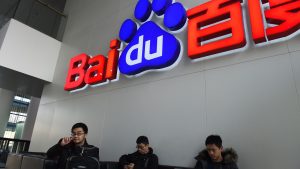
China’s most popular search engine, Baidu, froze bitcoin ads Thursday in what Bloomberg suggests is a “growing wariness” on behalf of business and government.
Baidu Mimicking Official Sentiment?
 Baidu has declined to comment on the move, but the ban has been confirmed by both Huobi and Okcoin, local Chinese exchanges.
Baidu has declined to comment on the move, but the ban has been confirmed by both Huobi and Okcoin, local Chinese exchanges.
Since Thursday, speculation has grown as to the search engine’s motives, with several theories presented to Bloomberg touching on official sentiment.
Shanghai consulting firm Kapronasia managing director Zennon Kapron speculated:
It could be a precursor to China being ready to push for a more nationalized approach to virtual currencies.
Online scams are also on government radar, Kaplon suggested, with recent “cases of scams” going after those Internet users who were “more prone to speculative trading.”
Baidu itself has furthermore come under scrutiny due to its own advertisement policy, which led to the promotion of unorthodox products. One such product — a medical procedure — actually proved to be fatal, resulting in the death of a medical student.
The ban “also reflects official sentiment,” Bloomberg adds, citing recent decisions on the part of the People’s Bank of China to “prevent Bitcoin from becoming entrenched in the financial system.”
Or a Sentiment Patchwork?
The atmosphere in China would, however, appear to be more complex.
While the country’s central bank has been generally wary of competition for its national currency, various initiatives have more recently pointed to a constantly evolving stance.
 China’s latest General Provisions Draft, submitted to congress in June, even made arrangements for virtual currency to be an officially-endorsed “people’s right” as part of a wider update governing virtual property and data.
China’s latest General Provisions Draft, submitted to congress in June, even made arrangements for virtual currency to be an officially-endorsed “people’s right” as part of a wider update governing virtual property and data.
Meanwhile, Chinese Bitcoin users’ 90 percent-plus trading share only looks set to grow amid uncertainty about financial bubbles.
In what has become known as the “China Calm,” the vast economy is currently steady compared to USD, but analysts are already defining factors that could upset the delicate balance.
Specifically, UBS points to property, restructuring of state-owned enterprises, and market pressures due to capital outflow as three major stumbling blocks which could prove decisive before 2017.
“In summary, downside risks remain in China’s continued effort to work through sizable inventory overhangs in their real estate market as well as in the restructuring of State Owned Enterprises (SOEs), which need to undergo substantial capacity reductions and management realignments,” Zerohedge reports on the findings.
